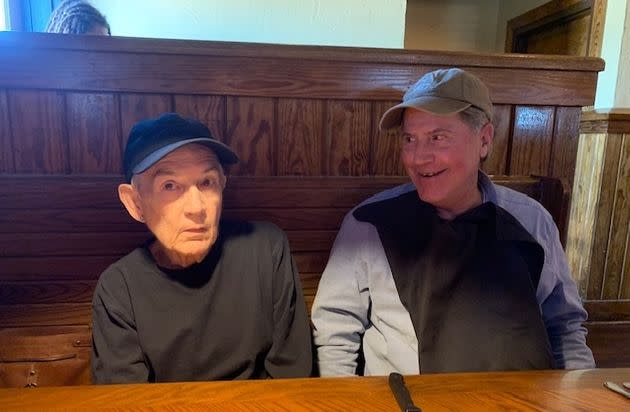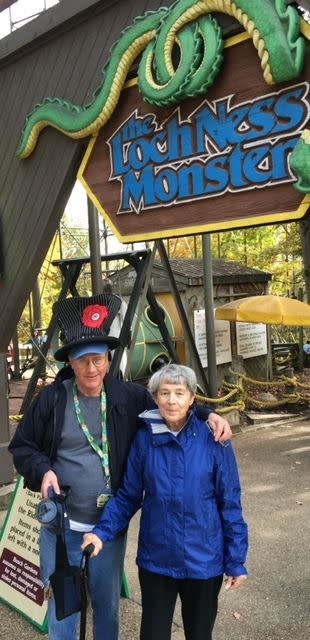My Wife Of 52 Years Just Died. I Wasn't Prepared For The Way My Grief Showed Up.

The author and his late wife, Diane, who died of colon cancer this September.
I never had an imaginary friend when I was a child. It took me 73 years, but I’ve got one now; except he’s not imaginary or a friend. He’s just invisible. I can’t see him, but I sure can hear and feel him. It’s my grief, but I call him Mr. G.
Mr. G moved in with me and my dog, Franklin, immediately after Diane, my wife of 52 years, died in September. I felt him creeping around the edges of my life for several months, but it took her death to fully throw the doors open so he could stroll right in and make himself at home. He’s here with me now. He’s always here.
My companion has no redeeming features. He’s loud, insistent, obnoxious, demanding and self-absorbed. He’ll suck the energy out of you faster than a caffeinated extrovert at a sales convention. Mr. G is the uninvited house guest from hell. If he wasn’t so busy with me, I suspect he would be selling timeshares or lining up a run for Congress.
The literature says there are five stages of grief ― denial, anger, bargaining, depression and acceptance ― that allow us to process the loss of a loved one and move forward. I must have missed that memo because I’m stuck with just two stages.
Earlier this year, Diane was diagnosed with inoperable, terminal colon cancer. That followed months of visits to doctors and emergency rooms for persistent gastrointestinal problems that were never resolved. There was no denying the diagnosis or the prognosis ― or the fact that she is now gone. I’m reminded of that every second of every day.
As far as bargaining goes, I’m a secular humanist, so I have no deities, demons, or other phantasmal entities with whom I can bargain for relief. I’m forced to confront the reality of my loss.
That leads me to acceptance. I passed through that stage months before my wife died. It’s hard not to when you’ve engaged hospice to care for your loved one and watch them slowly disappear mentally and physically. At the end, all I could do was hold her hand and watch her draw a final breath. That memory will stay with me forever.
So, I’m left with anger and depression ― Mr. G’s bread and butter.
Who am I angry with? For starters, I’m angry with all the doctors who never diagnosed the disease in time to do anything about it. I’m angry that they will suffer no consequences for their collective incompetence. I’m angry with Diane for smoking cigarettes for years and subsisting on a diet devoid of fruits, vegetables, whole grains or fiber. I’m angry with every senior couple I see that hasn’t experienced the loss of a spouse. Most of all, I’m angry at myself for not finding a way to save the woman I was married to for 52 years.
Depression? You bet. Some days I feel like I’m walking through quicksand with a 50-pound backpack. It’s hard to look forward to anything. I spend most of my time living in the moment, except when I’m gazing into the past and sifting through a lifetime of memories.
Nighttime is the worst. I’m still getting used to sleeping in a bed that’s half empty. Mr. G, of course, requires no sleep, so I rest when I can. I don’t like naps, but I do what I have to do to stay as strong as possible.

"Some days I feel like I’m walking through quicksand with a 50-pound backpack," writes the author, pictured here with Diane.
I’m no slacker ― I am doing my best to get through this. I’ve received an outpouring of sympathy and support from people. Hospice has provided bereavement services, and I’ve joined an online support group for widows and widowers. My doctor has put me on an antidepressant. I know I need it for the time being, but I hope to discontinue it in the near future. I don’t like the side effects or the idea of relying on medication to get me through the days and nights.
I get out of the house every day. I’ve found that walking 45 minutes to an hour is the best way to mute Mr. G’s destructive voice ― if only for a few hours. That will be particularly important in the upcoming cold weather months. I don’t need seasonal affective disorder joining forces with Mr. G. I’m not sure I could survive a combined attack.
Cooking is not my strength, but I manage to eat a mostly healthy diet of fruits, vegetables, nuts, whole grains, chicken, salmon and sardines. I avoid fried foods and soft drinks and try my best to lay off the fresh-baked chocolate chip cookies from Publix.
Shopping, errands and laundry are things I’ve done for years. They’re a welcome distraction from the ever-present Mr. G. For relaxation, I enjoy reading, writing and taking Franklin to the park. If I were 20 years younger, I’d probably try yoga or CrossFit training.
Do any of these things help me deal with the loss of someone I loved and who loved me our entire adult lives? Yes, but not nearly as much as I thought or hoped it would. I probably should have lowered my expectations. People tell me it’s a long journey out of the darkness. I’m hoping for incremental progress along the way.
I’m angry with all the doctors who never diagnosed the disease in time to do anything about it. ... I’m angry with Diane for smoking cigarettes for years and subsisting on a diet devoid of fruits, vegetables, whole grains or fiber. I’m angry with every senior couple I see that hasn’t experienced the loss of a spouse. Most of all, I’m angry at myself.
My family gives me the strength to keep going. The hugs, kindness and thoughtful expressions from them and other people in my daily life are something I cherish. Still, I don’t talk a lot with people about my loss because it doesn’t help and sometimes makes me feel worse. It’s also the sort of thing you have to experience to understand. This is a club nobody wants to join. The greatest gift I’ve received from everyone is the realization that I’m not alone, invisible or somehow less than who I was before Diane’s death.
They say you can be anything you want to be if you put your mind to it and work hard. That, of course, is nonsense. I never played shortstop for the New York Yankees, and that’s not likely to change. Right now, I would settle for peace of mind and the permanent eviction of Mr. G from my life.
They also say that time heals all wounds. The person who came up with that one must have been a raging optimist. It’s still early days for me, so I don’t know how I’ll feel a year or five years from now ― assuming I’m still around. My sense is that my wound will heal, but not perfectly, and there will be a lot of scar tissue. But for now, there’s just me and my grief, and I can’t imagine Mr. G ever going anywhere, no matter what I do or how long I live.
Ronald Paxton was born in Richmond, Virginia, and currently lives in Conway, South Carolina. He sold his first short story in 2008 and has since published eight novels, more than 50 short stories, a children’s book and poetry. Mr. Paxton’s short fiction has received nominations for the Pushcart Prize and Best of the Net awards. His novel “Tears at Sunrise” is a State Library of Virginia fiction selection.
Do you have a compelling personal story you’d like to see published on HuffPost? Find out what we’re looking for here and send us a pitch.
